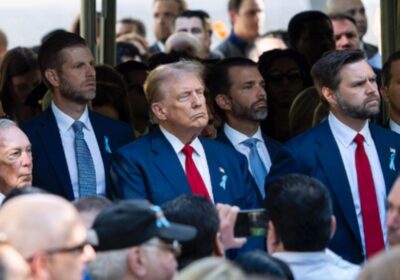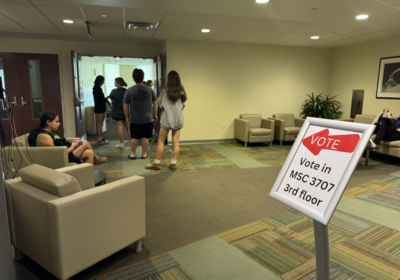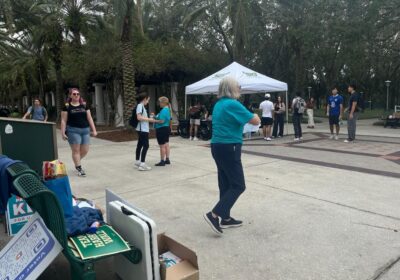Behind the series

ULS has featured speakers such as Abby Wambach (top left), Killer Mike (top right), RJ Mitte (bottom left) and Brandon Stanton (bottom right).
Students at USF are familiar with big names like Jessica Williams, Killer Mike and others coming to campus as part of the University Lecture Series (ULS).
However, students often know little about the selection process for ULS speakers or how ULS operates.
When it comes to choosing speakers, Center for Student Involvement (CSI) Campus Traditions Board Coordinator Athena Bressack said the process focuses on a couple main outlets of input.
One method is student surveys — both formal and informal — that ask for names and topics. Another is close communication with those who work at agencies from which ULS hires speakers, agents who are hired to focus on USF.
“They do a very good job of knowing our campus culture, knowing what types of speakers would be successful, and so we rely on their experience to help recommend ideas for us and then we’ll typically ask students how they feel about that, whether that’s through informal asking at Bull Market or via surveys,” Bressack said.
ULS is currently trying to expand its opportunities for student input, mainly through focus groups that consist of students from varied backgrounds in order to get a broader scope of who and what students want to hear about, according to Bressack. These efforts are expected to begin in the next academic year.
Currently, ULS surveys students of their own and adds questions to some Student Government (SG) surveys. Currently, a committee employed by CSI, an advisor and a graduate advisor vote on speakers.
Applications for new committee members will open in January.
“We’ll ask for input from the whole office when we’re doing speaker selection, not just the five that formally vote,” Bressack said.
Input is also gathered from those working within CSI and those involved in events. Student suggestions for speakers and topics are always welcome, either by email or in person, as emphasized by Bressack. However, they might not always be available.
“Sometimes, students will want someone but they don’t know that that person doesn’t do speaking engagements, so every celebrity doesn’t always do them or sometimes it’s a one-time gig,” she said. “So we will also asks what topics (students are) interested in … so that even if we’re unable to bring this specific speaker who may have topped our survey, maybe they don’t speak or they’re unavailable or they’re out of our budget, then we can say ‘Well, who’s comparable that the students would find interesting?’”
ULS is a product of CSI and exists in partnership with SG. It dates back to 1989, when it featured speakers such as Frances Moore Lappe and Edwin Newman. ULS funding comes from SG, with certain amounts set aside per speaker.
The administrative budget, which covers costs like renting space in the Marshall Student Center (MSC), was $4,300 this year, while the marketing budget sat at $5,000. To cover speaker contracts and related expenses, the budget was set at $219,570.
An additional $50,000 was built in for the new Global Conversation series, a collaboration between ULS, SG and the Center for Strategic and Diplomatic Studies run out of USF World, which features speakers on global issues.
Alan Gross, the former Cuban hostage and humanitarian aid worker, was the first in this new series. The voting process for selecting these speakers includes SG.
The prices are lump sums paid by ULS in order to cover not only the lecture but travel expenses, transportation expenses, lodging and other such costs, as well as payment to the agency hiring out the speaker.
Bressack is unaware of how much of the payments make it into the speakers’ pockets.
CSI hires speakers through two main agencies: Greater Talent Network and Keppler Speakers. Both companies offer a wide selection of speakers from many different backgrounds with a variety of topics to cover, including but not limited to business, politics, entertainment and sports.
This year, speakers ranged from $15,000 for Michael Uslan to $55,000 for Abby Wambach. In dealing with pricing, Bressack said ULS aims to go for a greater number of speakers over paying big money for expensive names.
The goal is to host five to six lectures a year, so speakers who cost $100,000 are unattractive to ULS. Plus, Bressack warned, cost doesn’t ensure better quality.
“We work really hard to be good stewards of the money we’re given,” she said.
Overall, for all the speakers ULS brought this year, CSI spent $229,500 of its $269,570 total budget.
When it comes to selecting speakers, the voting body looks for broad appeal.
“We try and pick names that students will know and be excited about who also have a message and a background,” Bressack said.
ULS doesn’t pick a theme for each year, although speakers can sometimes overlap in their messages. Bressack feels that ULS works hard to ensure a wide variety of topics are discussed.
She recalled Jessica Williams, who touched on her struggles as an African American woman and with mental health. R.J. Mitte discussed overcoming his disability. Killer Mike talked about race relations and clashes with the police, a hot topic at the time of his lecture.
“Our goal is to bring as many diverse voices as we can in a school year,” Bressack said.
ULS works with the Office of Multicultural Affairs in correlating speakers with themed weeks such as MLK Week, during which the message of diversity is typically championed. USF Week doesn’t have the same theming, and tends to lean towards more universal topics.
Bressack holds that ULS also seeks to provide a wide variety of viewpoints. However, speakers are not hired to respond to one another. In the past, ULS has featured lecturers such as Ron Paul in 2014 and Meghan McCain in 2010, a contrast from those who may have slanted to the left in their lectures.
On the other hand, Bressack noted that speakers are not hired based on their political affiliation.
“We don’t consider ourselves a political speaker series,” she said. “I think getting closer to the election season, there may be some desire from the student body that maybe in the beginning of next year we bring someone to address that. We don’t want to avoid engaging in those topics but we are a nonbiased or a nonpolitical entity.”
The hope is that students will not only go to see speakers that they agree with, as Bressack thinks it is great when students leave a lecture having disagreed with points the speaker made.
“It’s not a goal of ours that people necessarily agree with our speakers,” she said.
Bressack feels the lectures give students an opportunity to learn about new ideas and new ways of thinking about the world.
“Clearly, a lot of people come to our lectures for the opportunity to meet and see a celebrity and that appeal is really strong and that’s a great reason to come,” she said. “But we hope that when they come, they’re engaged in thinking about things that they can build connections in their own life.”
Bressack gave the example of Williams’s lecture, which attracted students because of her role on “The Daily Show,” who lectured about mental health.
“I don’t think people came to that lecture to talk about mental health,” Bressack said.
Of the challenges facing ULS, one is reaching students who don’t attend lectures and getting their input on who they would like to see.
“The challenging area for us is getting input from people who are not yet attending our lectures, which is the people we really need to reach,” Bressack said. “We want them to come and we want to bring people that will encourage them to come, so we’re always looking for ways to do that better.”
Another challenge is venue expansion. Currently, ULS hosts lectures in the Marshall Student Center, typically in the ballroom, oval theater or combination for an additional live stream audience. Bressack has heard many students ask why ULS doesn’t hold lectures in the Sun Dome.
The USF Sun Dome is a separate entity from USF, managed by Spectra, part of Comcast Spectacor. Costs for holding a lecture there are $25,000, which Bressack observed is more than some of the speakers cost.
In order to raise money for a move to the Sun Dome, ULS has thought about charging the general public for admission to events, as it is bound by Activity and Service (A&S) fee policy not to charge students for admission.
This is because ULS is funded through A&S fees, which students pay to the university each year. However, charging the public would still not cover the cost of a move to the Sun Dome, and charging students would be against the spirit of what ULS does, according to Bressack.
As of now, the lecture series will stick with the Marshall Student Center as its venue of choice.







